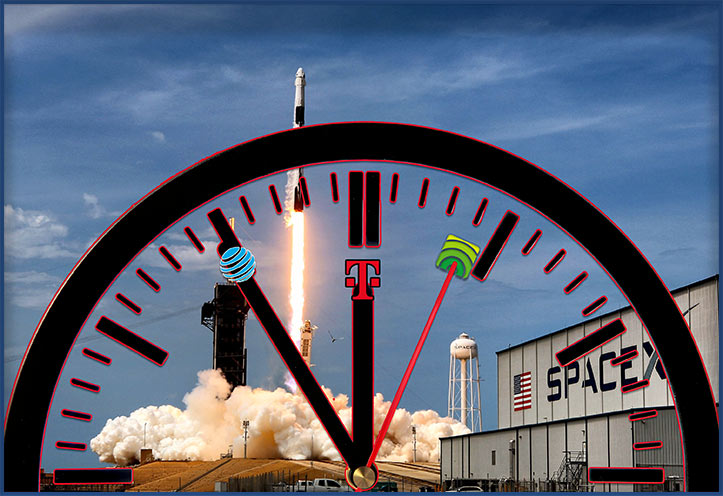
An AT&T spokesperson informed Wireless Estimator that the carrier was not opposing supplemental satellite connectivity and that SpaceX’s “desperate” claim refers to their opposition to their STA request, not opposition to the service or testing generally. AT&T’s filing is available here. AT&T said the FCC must require “robust technical demonstrations showing how they will ensure that SCS deployments will not cause interference to other authorized terrestrial services.”
AT&T and the Rural Wireless Association (RWA) have coordinated “a desperate, 11th-hour campaign” to prevent SpaceX from testing its mobile coverage from space in partnership with T-Mobile with “baseless procedural claims while offering no substantive reasons” for denying its special temporary authority (STA) approval, SpaceX said in a filing with the FCC.
Although Dish isn’t a voting carrier member of RWA since the maximum number of subscribers a carrier can have is 100,000, and Dish Wireless is currently at 7.73 million, SpaceX said RWA was Dish’s “mouthpiece.”
The STA, available here, is to launch a second-generation Starlink satellite equipped with “direct-to-cellular communications payloads” by December 1. The test, which would be made in 26 locations, would utilize T-Mobile’s PCS G-Block radio spectrum to beam data to smartphones.
AT&T and RWA argue that SpaceX should seek an experimental license from the FCC’s Office of Engineering and Technology rather than an STA. They state that any testing should be authorized through an experimental license.
“The Commission has good cause to approve this request because it is in the public interest. Granting this STA will enable SpaceX to begin testing its transformative direct-to-cell technology, which will bring connectivity in areas where terrestrial mobile networks are absent or have been impacted by natural disasters,” SpaceX said. The company said the STA would also allow it to confirm the operational status of its direct-to-cell satellites and their ability to communicate with cell phones immediately upon insertion, rather than waiting weeks while the satellites complete obit raising to ensure proper functioning.
SpaceX has said it will roll out its Starlink cellular service as early as next year, putting it in direct competition with AST Space Mobile’s cellular satellite system, in which AT&T is a partner.
SpaceX and T-Mobile first announced their intention to work together on satellite-to-mobile coverage in August 2022.
In April, the FCC’s Space Bureau and Wireless Telecommunications Bureau opened a proceeding to accept comments on filings of SpaceX and T-Mobile to establish space coverage.
In a 99-page response to all the parties opposing SpaceX’s application, SpaceX wrote, “Unfortunately, a few parties hoping to build competing systems also resort to the growingly common tactic of trying to have the Commission force SpaceX to make public unrelated proprietary information for unnecessary but competitively harmful reasons.”
















